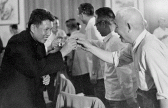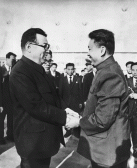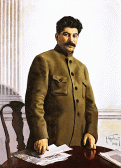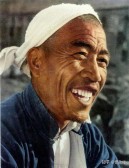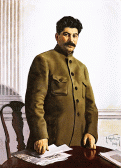Challenges of the Revolution
Show Honor to Comrade Pol Pot!
It is with deep sorrow that we learned that Pol Pot died in Cambodia on April 15, 1998 at 23:15 (local time), according to a heart attack. For years he had been seriously ill with malaria, yet he continued to be among his people, in the jungle, fighting for the freedom and independence of his country, never allowing himself to be tempted to flee his country and people to seek treatment elsewhere. His death leaves a great void in the hearts of all the authentic revolutionaries and anti-imperialists of the whole world as well as the…
- Read more 0 comments
Pol Pot's "Genocide" in Cambodia is a Lie of Imperialism
The sentence had great international emphasis on the word…
- Read more 0 comments
Stalin Today
With the passage of time, Stalin's works and thought…
- Read more 0 comments
Revisiting the Asiatic Mode of Production
That awkward appendage to the corpus of Marxism—the Asiatic Mode of Production (AMP)—has been repeatedly declared dead, with some Marxist theorists calling for its final burial. Most notably, Perry Anderson once argued that the notion "be given the decent burial it deserves." However, in contrast, Umberto Melotti has revived the concept in his thorough and insightful analysis.
The persistent reappearance of the AMP suggests that it contains a vital principle.
…
- Read more 0 comments
A Journey of a Thousand Miles to the Splendid Country

- Read more 2 comments
Hanoi's Cambodia Adventure

"Here," the visitors are told, "is where the British professor, Malcolm…
- Read more 0 comments
Malcolm Caldwell killed in Phnom Penh

The trip is taking place against a very significant political backdrop. On Dec. 23, the British scholar Malcolm Caldwell, who was visiting Kampuchea, was assassinated in the Phnom Penh house where he was staying by terrorist enemies of the Kampuchean government. Tw…
- Read more 0 comments
Book Review: The Challenge of the Kampuchean Revolution

Today it is the Communist Party of Kampuchea headed by Pol Pot that all-sidedly incarnates the dynamic principle of materialist dialectics: people’s war. Po…
- Read more 0 comments
Bitter Fruit of Revisionism

For over thirty years the peoples of Vietnam, Cambodia (now Democratic Kampuchea) and Laos fought side by side against the French and then the U.S. imperialists. Their victories were not only a tremendous material blow against the imperialists, they were an inspiration to people everywhere struggling for their liberation. Th…
- Read more 1 comment
Kampuchea: Report From Behind the Lines

Suddenly we were mired in a mud pit, the truck’s wheels spinning uselessly. Then, seemingly out of nowhere, ten Khmer Rouge soldiers appeared in crisp green uniforms and pushed us out onto firmer ground. This was our introduction to Democratic Kampuchea.…
- Read more 0 comments
Hanoi’s Refugee Policy Just Like Nazis

- Read more 0 comments
Hoxhaism or Leninism?

These polemics have been directed against the Communist Party of China (CPC), particularly…
- Read more 0 comments
Vietnam's Vietnam

- Read more 0 comments
US Diplomatic Cables on Democratic Kampuchea in 1978

“We believe a national Cambodia must exist even though we believe the Pol Pot regime is the world’s worst violator of human rights,” reads a cable sent by…
- Read more 0 comments
Albania Praises Vietnamese Invasion of Kampuchea and Attacks China

- Read more 0 comments
Socialist Kampuchea

Upon arrival in Peking, Pol Pot,…
- Read more 0 comments
Tito: Fighter for National Independence

Josip…
- Read more 0 comments
Stalin Was Key To Growth of Socialism
On this, it is a good opportunity to take a brief look at who he really was and what he represented.…
- Read more 0 comments
Hoxha, Reminiscent of Trotsky's "Leftism"

Eighty-five years ago, in the face of World War II, Leon Trotsky worked hand-in-glove with the Hitler fascists. He attacked the antifascist front from the "left" while the ruling circles in the West attacked it from the right.
Enver Hoxha’s legacy continues to be used to push a divisive agenda amid the increasing threat of global conflict. His book, Imperialism and the Revolution, still…
- Read more 0 comments
Is Cuba a Non-Aligned Country?

On June 21, Zaire’s President Mobutu Sese Seko declared in a nationwide speech that his country will boycott the non-aligned summit scheduled to be held in Havana next year. Mobutu denounced the…
- Read more 0 comments
Marx Laid Basis For 3 Worlds Theory

What may not be as widely known is that Marx and Engels’ view of the international situation in their day (the latter half of the 19th century) was the forerunner of the theory of three worlds, developed under today’s conditions by Mao Tsetung.…
- Read more 0 comments
Quotes From Secret US Reports on Kampuchea

This is exactly what The Call has done. A Call reporter recently got hold of an official State Department manual of "evidence" against the newly-liberated South-east Asian country. Included in this volume, prepared for the UN, are accounts from refugees as well as a number of Airgram reports from CIA and U.S. embassy staffers in Thailand.…
- Read more 0 comments
Why Vietnam and the USSR invaded Democratic Kampuchea

The military aggression against Democratic Kampuchea early this January and its occupation by more than ten heavily Soviet-equipped Vietnamese divisions shocked the whole world.…
- Read more 0 comments
Monarchy or Democracy

Certainly, the constitution gives the King…
- Read more 0 comments
Kampuchea - Who Should We Support?

New York City - "I had a deep love for the Vietnamese and I still do. Not in a romantic sense, but because they were the cutting edge of the struggle for liberation all over the world... The cutting edge of the struggle for everything we fought for, however, has moved from Hanoi and Saigon to the maquis[jungles] of Kampuchea. The cutting edge is now the Kampuchean people's struggle for the right to self-determination, self-definition, independence and freedom."…
- Read more 0 comments
1978 Interview with Deputy Prime Minister Ieng Sary

The high point of our visit to Kampuchea came the day before we were scheduled to leave. Ieng Sary, the Deputy Prime Minister in charge of foreign affairs, had agreed to give us an interview. He would brief us on the answers to numerous questions we had raised about the history of Kampuchea’s revolution and its present state of development.
When we arrived at the house where the meeting was to take place, Sary was outside waiting for us. Dispensing with all formality, he came over to our car, embracing each of us as we got out.…
- Read more 0 comments
U.S. Bombed Democratic Kampuchea Long After War

The U.S. government claims that its war against the Kampuchean people ended in April 1975. But it really didn’t.
Aggressive U.S. actions against Kampuchea have continued to take place. Our recent visit enabled us to gather firsthand evidence about one such incident–the bombing of Siem Reap.
Siem Reap, located in the northwest part of Kampuchea between Lake Tonle Sap and the Thai border, was the site of a vicious bombing raid carried out by U.S. Ai…
- Read more 0 comments
Why Phnom Penh Was Evacuated

In the spring of 1975, Phnom Penh was a city swollen, choked and starved by war. Among its 3.1 million inhabitants were 2.5 million people who had crowded into the city between 1970 and 1975. They were refugees from the US war of aggression that had left their villages bombed out and their ricefields defoliated. This is the story of how and why Phnom Penh was evacuated after the victorious Revolutionary Army entered its streets on April 17, 1975.
…
- Read more 0 comments
Malcolm Caldwell: Scholar, Activist, and Advocate of the Kampuchean…

…
- Read more 1 comment
Anti-Communism and the Hundreds of Millions of Victims of Capitalism

- Read more 0 comments




